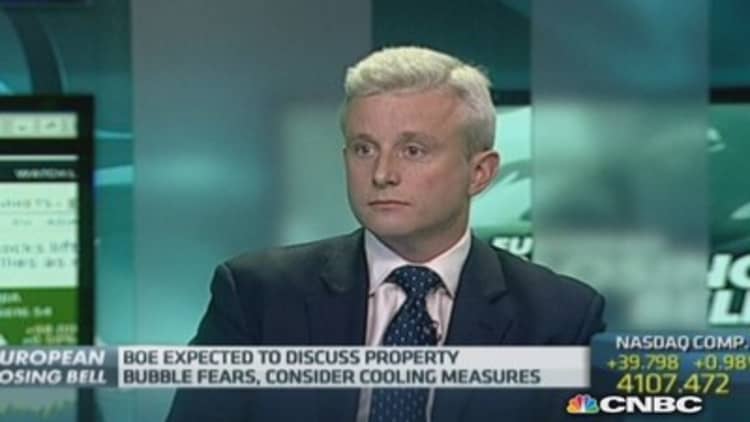The U.K.'s economic output will top its pre-crisis peak in the next few months, according to a new forecast, marking an end to the so-called Great Recession that has plagued the county for six years.
The country's economy has expanded quicker than expected, and is now running at growth of around 3 percent year-on-year, the National Institute of Economic and Social Research (NIESR) said on Friday.
In its quarterly economic forecast, the think tank upgraded its gross domestic product (GDP) forecasts for Britain to 2.9 percent for 2014, from earlier estimates of 2.5 percent, and to 2.4 percent in 2015, from 2.1 percent. The NIESR expects growth to remain around 2.4 percent per annum until 2017.
Read MoreBank of England leaves rates; asset purchases unchanged
"Growth has certainly accelerated quicker than most people - including us – were expecting. Although historically, recoveries in the U.K. have tended to progress with reasonable speed," Jonathan Portes, director of the NIESR, told CNBC.
As a result of this growth spurt, U.K. GDP will exceed its 2008 high "in the next few months," the NIESR said – significantly faster than its previous estimate of 2015. From peak to trough in 2009, the economy shrank by 7.2 percent, according to the Office for National Statistics (ONS).
In the first quarter of this year, Britain posted GDP growth of 0.8 percent quarter-on-quarter. But despite this marking the fifth quarter of expansion in a row, the ONS said GDP remained 0.6 percent below its pre-crisis peak.
By contrast, the U.S. economy is already around 6.3 percent bigger than it was at the end of 2007.
Read MoreUK economy grows for fifth straight quarter
"On the official figures, it wasn't the case that the U.K. economy made up the ground it lost since the crisis in the first quarter of this year, but it almost certainly will in the second," Portes said.
The NIESR also issued monthly GDP estimates on Friday, and said that output grew by 1.0 percent in the three months to the end of April - just 0.17 per cent off its pre-recession peak.
Portes added that, after revisions to official GDP data, it "could well be the case" that the economy actually exceeded its peak in the first quarter.

Rate hike looms?
The forecast follows a string of data releases that suggest the U.K.'s economy is picking up steam. Unemployment fell to 6.9 percent in the three months to February, and figures published Friday revealed that manufacturing output continued to grow in March, while a pickup in exports saw the trade deficit narrow. Inflation, meanwhile, hit the Bank of England's (BoE) 2 percent target in December for the first time since November 2009.
But the NIESR was quick to point out that although growth was picking up, some serious issues remained.
"It might by symbolic that the economy is about to top its 2008 peak, but this isn't what matters to individuals. Per capita GDP is still much less, and real wages are 6 percent lower than they were in 2009," Portes added.
Read MoreUK inflation hits BoE target; first time in 4 years
The think tank does not expect per capita GDP to exceed its pre-crisis peak until 2017, while real wages will not make up lost ground until at least 2018.
The forecast comes a day after the BoE opted to leave left interest rates and asset purchases unchanged at its monetary policy meeting, although signs of a strengthening recovery and fears over house price rises have led some to call for a rate hike sooner rather than later.
"Debate within the Bank of England over when interest rates should start to rise is likely to become increasingly intense," Howard Archer, chief U.K. economist at IHS Global Insight, said in a note. He added that the more hawkish members of the BoE's Monetary Policy Committee could start to push for a small rate hike before the end of the year.
"We currently maintain the view that interest rates are still most likely to start edging up in the second quarter of 2015, although there is clearly a growing likelihood that the Bank of England could act before then."


